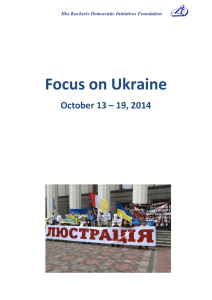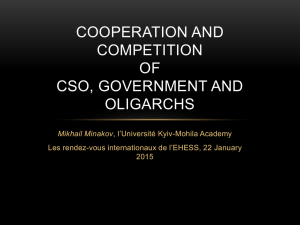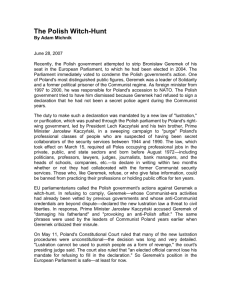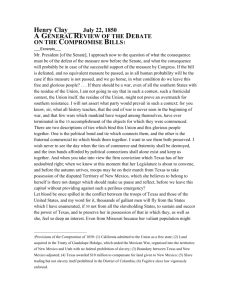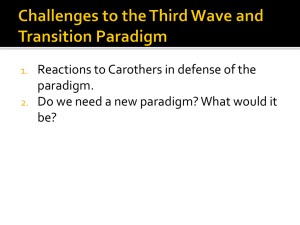Debating Lustration Implications and Comparative Perspectives
advertisement
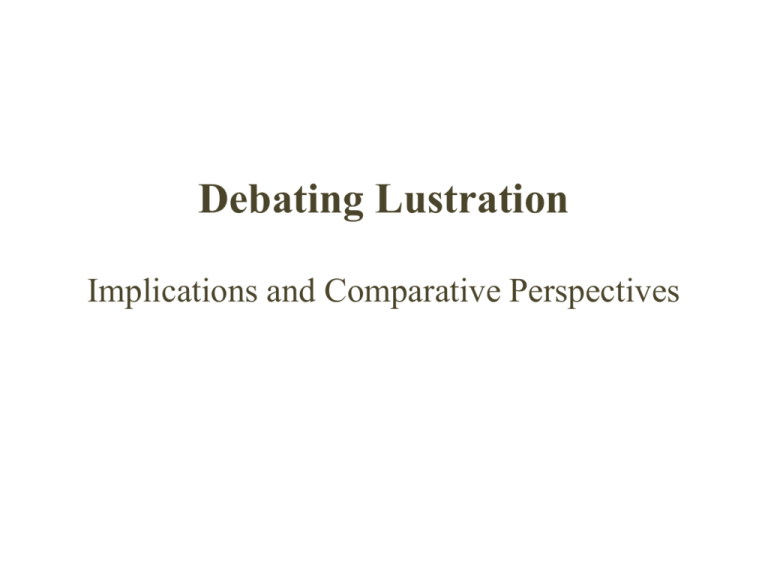
Debating Lustration Implications and Comparative Perspectives What is LUSTRATION? Concept Lustration: - purification, vetting, cleansing, purge/truth- finding, retribution, memory…? • Transitional justice: – Transition … to… from…? - Democracy - Nazism (denazification) - Communism (decommunization) - Yanukovich rule (de…?) – Justice … • Coping with the past: memory, justice, truth, reconciliation, retribution Transitional or retroactive justice? Transitional justice in practice • • • • • • • Trials Restitution Truth commissions Access to files Official apologies Cleansing of public administration Reopening of statutes of limitations Lustration in practice • Revealing truth opening of archives, making true information public, disclosure requirements • Decommunization removal of ex-communists from political positions and public administration Lustration: Justice - Revealing the truth v. prosecution, trials, retribution, and vengeance - certain possible limitations on political rights v. criminal prosecution - Presumption of innocence - Human rights, rule of law and due process - Should the new, democratic state use the same methods as the old, repressive one? Lustration: democratization • Generational change – New ideas, clean politics, trust and legitimacy – Disruption and quality of governance • Empirical studies: the causal link not established Lustration: democratization There is no reason to believe that a large number of old functionaries, behaving in the past for the motives of fear, opportunism, or lack of better prospect, will necessarily undermine the democratic rules of the game in a totally new system, operating along different modes and procedures Sadurski Lustration: reconciliation and conflict resolution cleansing and retribution policy - Stigmatization: (the risk of) creating a second class citizenry - Imposing collective responsibility for complicity on past wrongdoings - Dividing the society v. policy of forgiveness - let’s the bygones be bygones - amnesty but not amnesia Lustration: reconciliation and conflict resolution Dividing the society at a time when strong mobilization is needed to build sustainable democratic institutions and counter external threats Lustration in comparative perspective • Radical model – Publicity + exclusion of a big group of people from the political class: former GDR, Czech Republic – Czech Republic: 310.000 people screened, 15.000-positive • Intermediate model – Ban on former secret agents and KGB informers to hold senior positions: Albania (90-ies laws) and Baltic states • Lenient or moderate model – Disclosure requirements but no bans: Poland, Hungary, Bulgaria The variables for the choice of models • The degree of repressiveness of the past regime • Mode of transition – Revolution v. round-table • Involvement of the elements of the former regime in the new power European standards • PACE Res. 1096(1996) on measures to dismantle the heritage of former communist totalitarian systems – guilt must be proven in each individual case. Individual guild rather than collective guilt should be established – Aim of lustration is to protect democracy, not to punish those guilty – the right of defense, the presumption of innocence and the right to appeal to a court must be guaranteed – lustration has strict limits of time in both the period of its enforcement and the period to be screened – Limitations periods can be extended but no retroactive laws shall be adopted European standards Venice Commission opinions 2009: Albania - Law adopted 20 years after transition - lustration procedures, despite their political nature, must be devised and carried out only by legal means, in compliance with the Constitution and taking into account European standards concerning the rule of law and respect - for human rights, termination of the mandate of the President of the Republic, the members of the Constitutional Court, the members of the High Court, the General Prosecutor, etc., violate the constitutional guarantees of their mandate and are therefore contrary to the principle of the rule of law European standards Venice Commission opinions 2012: FYR Macedonia - Introducing lustration measures a very long time after the beginning of the democratization process in a country risks raising doubts as to their legitimacy - The application of lustration measures to positions in private or semiprivate organizations goes beyond the aim of lustration - rule of law and due process of law before the lustration commission shall be ensured - The identify of persons considered as collaborators should be published only upon a relevant court judgment Democratization v. prosecution “the goal of lustration shall consist, above all, in the protection of democracy against reminiscences of totalitarianism, while the secondary goal thereof, subordinated to the realisation of the primary goal, shall be the individual penalisation of persons who undertook collaboration with the totalitarian regime”quoted from a judgment of the Polish Const Court
